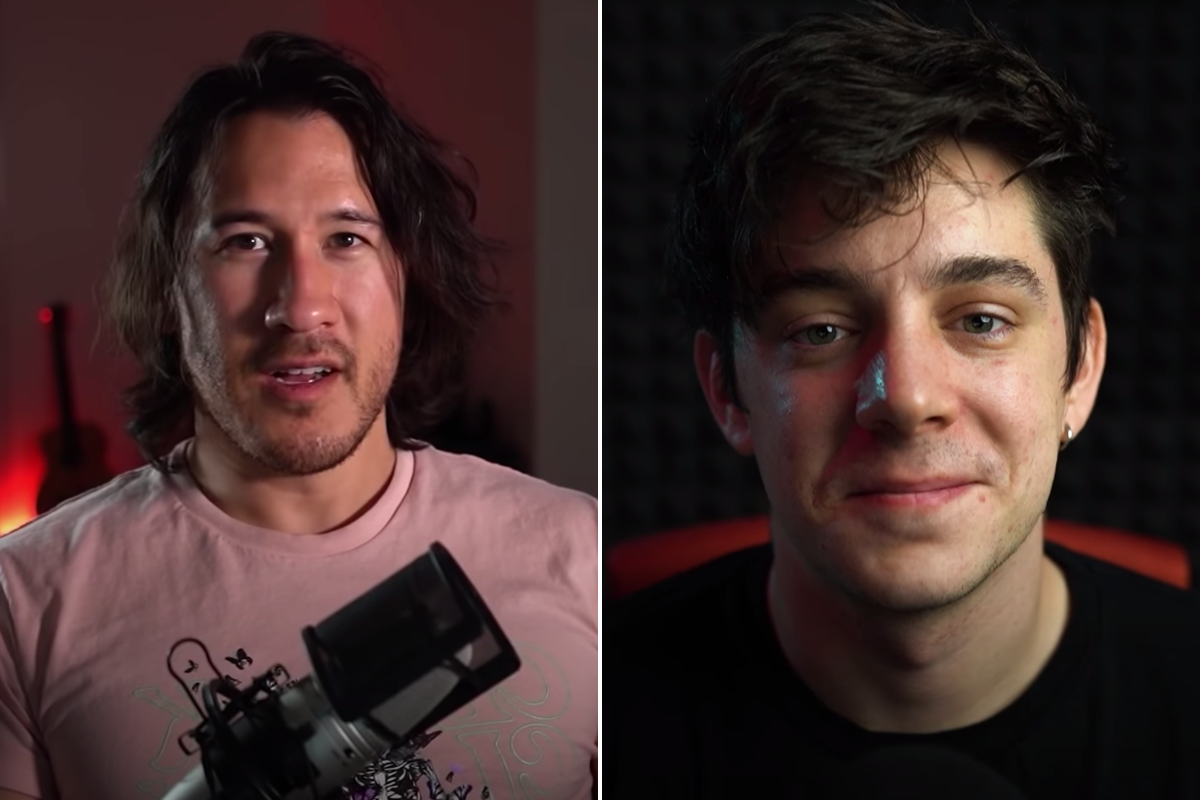Social Media
The Life and Death of Unus Annus
The project provided a unique and occasionally profound experience and a new perspective with which many of its fans had not engaged before—and all that from a YouTube channel!

We live our lives taking each second for granted. But what would you do if you knew how much time you had left? Unus Annus. One year. This channel, much like all of you, has a limited amount of time. And every day we march ever closer to this channel’s inevitable doom. That means we’ll be uploading every single day until the clock strikes zero. And then, it’s game over. Bye, bye. Finito. Finished. Curtains. Gone, gone. Night, night. Dead. Forever. Make no mistake, this doesn’t mean that we’ll just stop uploading. When time runs out we will be deleting this channel and every single video on it. And you’ll never be able to see them again. Because much like death, you can’t take it with you. And all we’ll have is the memories that we make along the way… so the clock starts now. But the choice is yours. Will you join us? Or will you miss out on your one chance to be a part of Unus Annus? Because time is already running out. The train is already moving. So, subscribe now, because death is coming… For there are no second chances. And if you miss out all you’ll be left with is regret. Memento mori. We’ll see you tomorrow. Unus Annus.
This was how YouTubers Mark Fischbach (“Markiplier”) and Ethan Nestor (“CrankGameplays”) introduced the channel that would host their unique “Unus Annus” project. Their plan was to dedicate a year to making videos and bring subscribers along for the journey. At the end, however, they pledged that they would delete the channel and all its content—by then, they had accrued over 4.5 million subscribers and each new video was attracting over a million views. They made good on this plan at midnight on November 13th, 2020 before an online audience of 1.5 million people.
Fischbach and Nestor didn’t just set out to make videos, their motivation was memento mori, Latin for “remember, you will die.” They wanted to remind their followers that nothing lasts forever, so we should make the best of the time we have now in the situations we have now, and make memories now, because those memories will be all we will have left. To reinforce the message of death’s inevitability and the shortness of life, both creators asked their followers not to re-upload the videos once the project ended, and warned that if videos were uploaded, they would seek to have them removed by YouTube. When limited merchandise runs were exhausted, they were sent to the “graveyard” on their site. In the project’s final days, Fischbach and Nestor even staged a “Resurrection Sale,” bringing back the merchandise runs so fans had a final chance to grab a piece of memorabilia for remembrance. Demand was so high that the store briefly crashed, a fourth warehouse was rented to handle shipments, and most of the late orders had to be delayed—possibly until January.
In the project’s microcosm of life and death, Fischbach and Nestor experienced many of the same things normal people go through in life at one point or another. Before the COVID-19 pandemic, and after lockdown restrictions were eased, they would find someone to teach them something interesting and new. These activities included learning how to blow glass, eat fire, DJ, drum, walk on broken glass, and perform aerial lyra. A fight coordinator showed them how to stage a realistic fight and put a scene together, and at the end of their video they staged their own scene. Those are just a few examples.
The project also featured moments of personal growth and discovery, in which Fischbach and Nestor pushed boundaries and sought to escape their comfort zones. They saw a hypnotherapist to analyze their “darkest dreams”; they painted each other nude; one of the final videos was entitled “Being Brutally Honest with Each Other,” during which they each spoke openly about the other and about the past year, an episode that produced laughter and tears. Of the project’s two creators, Fischbach was more involved in self-exploration and testing its limits. He tried to conquer his aquaphobia by swimming in a pool in the pitch black of night and he swam in the open ocean—a video labelled his “greatest fear.” In another video, he experienced being tasered. Why? Because, why not? He wanted to see what his body could endure. Both Fischbach and Nestor were also pepper sprayed and endured the consequent agony for two or three minutes unassisted. Again, just a few examples.

And no life would be complete without instances of stupidity that produce stories that open with “Hey, you remember that one time when…?” and Unus Annus had plenty of those. There was a lively game of “brick soccer,” and Fischbach cooked a meal while blindfolded, guided only by Nestor’s instructions over Facetime. Amazingly, over the course of the year, no fingers were lost and no camera crew were seriously injured. To test the filtering capability of Life Straws, they drank urine through them to see if they could still taste it (they could). In a few videos, they played “Nut ball” which involves two competitors sitting opposite one another on the floor with their legs open, rolling a ball back and forth to try and hit one another in the testicles. Stupid stuff, but you get the point.
But the most interesting aspect of Unus Annus was its conclusion. Fischbach and Nestor recorded a video entitled “Accepting the Truth” in which they reflected on the past year and came to terms with the channel’s impending end. Facing death with peace of mind is better than kicking and screaming against the inevitable, but this instalment also enabled the project’s creators to experience the reminiscences and eulogies of those mourning the soon-to-be-departed. The last video was a 12-hour livestream which culminated in the live ending of the channel, but it also served as a vehicle for its creators to experience the things the deceased normally don’t get to enjoy.
That extended funeral was a celebration of the past year, during which Fischbach and Nestor re-watched some of their videos and provided commentary, discussed events “behind the scenes,” and spoke with guests who had participated in their various pranks and adventures along the way. They were even able to “settle their affairs” by erasing their social media profiles, and the merchandise store was set to close at the time of passing. In a previous video, they had even picked out a custom $6,000 casket which they presented to the viewers. Fischbach and Nestor and their producer Amy (Fischbach’s girlfriend) each took a turn lying in it as they were eulogized by the other two, an act that is satisfying for the individual being eulogized but also uniquely cathartic for the person delivering the eulogy because their words are actually heard.
“The family”—the viewers—were not left out. Throughout the livestream, Fischbach and Nestor posted a variety of hashtags on Twitter so that fans could interact with Unus Annus: #TattusAnuus allowed fans to showcase their Unus Annus-themed tattoos (Nestor himself got one during the livestream); #UnusAnnus and #UnusAnnusIsOver were used by fans to share artwork and memes; and #MementoMori was the hashtag fans used to send their final goodbyes. This allowed them to celebrate with the project’s creators before the end, and the community of 1.5 million people watching when the clock hit zero were able to engage in the strangely cathartic experience of dying along with the channel. There is something about being with someone when they die (I’m speaking of real death here, not just the shuttering of a YouTube channel) that one misses when loved ones pass in our absence—a sense of peace that comes when one watches the transition from life to death. That something can be hard to describe, but seeing and hearing the regrets of those who missed the ending of Unus Annus speaks to its existence.
What will be the wider impact of Unus Annus? Forgive the cliché, but time will tell. In the immediate aftermath, people seem to have taken the message of Unus Annus to heart. Many said they had been inspired to push on to new things and live their lives anew because, as Fischbach and Nestor would say, the clock ticks on. It’s poetically beautiful that they both sought to engage in something so original and that a huge following came along for the ride. Their parting gift was a unique simulation of life and living, of death and dying, and of how each individual deals with and reconciles those things to their own way. The project provided a unique and occasionally profound experience and a new perspective with which many of its fans had not engaged before—and all that from a YouTube channel!
The channel may now be gone, but its creators are not—both continue to run their own channels and both say that Unus Annus provided them with great experiences of their own and new inspirations for the future. So, remember to make the most of the time you have left because you can’t take it with you when you die. It is better to be left with valuable memories than regrets. Memento mori.






